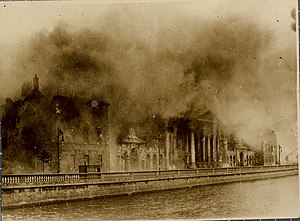Crethian Civil War
This article is incomplete because it is pending further input from participants, or it is a work-in-progress by one author. Please comment on this article's talk page to share your input, comments and questions. Note: To contribute to this article, you may need to seek help from the author(s) of this page. |
| Crethian Civil War | |||||||||
|---|---|---|---|---|---|---|---|---|---|
| Part of the Crethian War for Independence | |||||||||
 The Royals Palace in Donhaven burns after an assault by republicans. | |||||||||
| |||||||||
| Belligerents | |||||||||
|
| ||||||||
| Commanders and leaders | |||||||||
| Wilhelm Cameronsen |
Margaret of Donhaven | ||||||||
The Crethian Civil War was a conflict that took place during the Continental War and the Hallanic Wars during the post-war period. It resulted in the establishment of an independent Crethian republic following the dissolution of the Kingdom of Hallania.
Initially starting as the Fourth Crethian Uprising against the Hallic royal government, fighting broke out between republican rebels and the official royal government-in-exile that was established during the war. Opposed to the continuation of any monarchy, republicans organized under the Free Crethian Army began to target royalists that supported independence. Fighting broke out between the two factions and lasted for over two and a half years. The royalist faction was loyal to the Third Kingdom of Crethia and supporting Margaret of Donhaven's claim to the throne. It was composed of conservatives and nationalists that supported the monarchist cause, while the Crethian Free State was supported by liberals, socialists, and republicans, in addition to prominent conservatives and nationalists with republican leanings.
Following the assassination of Margaret of Donhaven at the hands of the Free Crethian Army, the royalist cause began to collapse and the republicans were able to establish control over the whole of the country by February 1917. At this stage, the Crethian Free State continued to fight against royalist Hallania in support of other republican and nationalist factions in the Hallanic Wars.